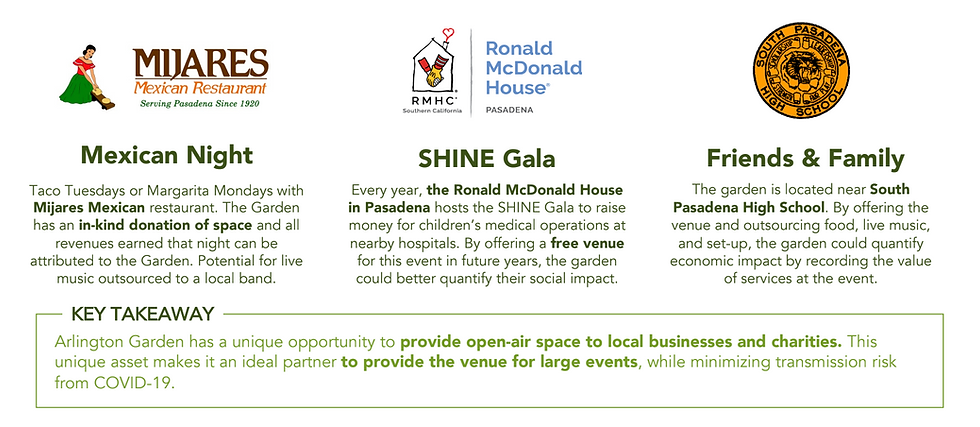Project Spotlight: Arlington Garden
- Charles Liu
- Dec 28, 2020
- 3 min read
Find out about how we quantified our client's impact to drive public policy advocacy in their community and greater California.

Our Client
Arlington Garden is a climate-appropriate, habitat garden offering learning, inspiration, and enjoyment for all. It is a three acre garden on Caltrans-owned land that is leased to the City of Pasadena and entrusted by the city to Arlington Garden in Pasadena, a non-profit 501(c)3 corporation. This garden is not only friendly to people and pets, but also exists as a refuge for Pasadena’s native fauna. Birds, bees and butterflies are particularly abundant and can be seen throughout the year. Arlington Garden has been developed by a collaboration between Arlington Garden in Pasadena, City of Pasadena, Pasadena Department of Public Works, and Pasadena Water & Power, with help from Pasadena Beautiful Foundation and the Mediterranean Garden Society. Continued support comes from garden clubs, local businesses, nurseries, neighbors and friends.
In 2019, Arlington Garden began expanding into educational programs, partnering with local schools and universities. They became the first LA Compost co-op hub in Pasadena, providing free access for neighborhood compost. They were awarded the 25th Senate District Nonprofit of the Year and received their first capital grant from Pasadena Community Foundation. Earned revenues have been continuing to grow through marmalade sales, photo permits, and hosted gatherings.

Project Overview
Arlington Garden is seeking methods to better quantify the social and climate impact they have in the city of Pasadena. These methods would ideally capture the impact on air quality, heat reduction, mental health improvement, and economic stimulus to the city. They would like to use these methods to function as a value proposition to the city as well as an advocacy tool to contribute to the spread of climate activism by other nonprofits. Arlington Garden would also like research done on the financial implications of these metrics. This could result in a financial valuation of the organization’s impact. If the project scope needs to be expanded, the organization is also seeking ways to expand educational and research initiatives as well as potential earned revenue streams.

Our Approach
After sifting through case studies that illustrate how cities have placed a value on the impact of their community gardens, we quantified the effects of the garden across three major categories:
Environmental (captures the heat and emissions reduction contributed to the city
CO2 and Carbon Emissions
Rainwater Stored in Vegetation
Air Pollution Removed
Social (captures the mental health benefit and healthcare cost savings for the city)
Hedonic Value - represents the value a customer receives based on the subject experience of fun and playfulness. It is affected primarily by 2 values: distance from the garden and the quality of the garden itself
Direct Use Value - represents the value a customer receives based on the money saved by not having to pay for recreational activities done at the garden that they otherwise would be willing to pay for
Economic (captures the financial value provided to local businesses and restaurants)
Community Cohesion Value - represents the time and money invested into the garden by local community residents and serves as a proxy for the value of social capital the garden has provided to Pasadena
Healthcare Costs Avoided - contributes to reducing healthcare expenditures of its park visitors by providing an activity that adds to their weekly step count, which has been shown to decrease healthcare costs
Future Initiatives
We also came up with different ways that the garden can take more direct action to encourage community spending and donations.
Collaborations with local organizations
We found specific organizations in Pasadena that the garden could potentially partner with to host regular events to bolster community spending.

In-kind donations of Marmalade
Yes, marmalade – the citrus fruit spread! A unique aspect of the garden is that it produces its own marmalade and distributes the product at certain partner stores in the community. In one of our meetings, the garden mentioned that they had a lot of extra marmalade that was not purchased. We thought that the incentive of marmalade may be a good way to encourage community spending.
"If you spend $x at this store, you qualify for one free jar of our marmalade."

Our Findings
After running the numbers and using conservative benchmarking figures, we came up with a total dollar amount that addresses the garden's impact on the greater Pasadena community.

Looking back at this project
This engagement was definitely more research-heavy than usual, but working to provide evidence for policy change advocacy was a great experience for our team.
If you feel that your organization can use our help, fill out our client interest form!



Comments